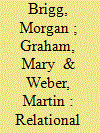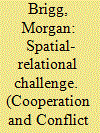| Srl | Item |
| 1 |
ID:
079653


|
|
|
|
|
| Publication |
2007.
|
| Summary/Abstract |
Indigenous societies have responded to a legacy of missionisation, universalist Christian beliefs and global contemporary Christian music through their own expressions of worship in a myriad of ways. This article considers the role of emotions in Australian Aboriginal expressions of contemporary Christian music amongst Yolngu in the Northern Territory. Moral obligations to kin and land are strategically embodied in Yolngu traditional ritual performance and shape appropriate "performative emotions." These emotive ideals persist through Christian worship styles and have influenced the composition and performance of Yolngu Christian music. Because Indigenous performances are based on inherent connections between place and personhood, it is argued that translocal sentiments of belonging can be shared amongst Australian Aboriginal communities as well as amongst other Indigenous groups at Christian gatherings. Thus, while Indigenous communities participate emotively in the worldwide Christian arena through contemporary Christian music, they also resonate with one another at the level of translocal sentiments expressed in conceptions of self and personhood that are based in songs about the country.
|
|
|
|
|
|
|
|
|
|
|
|
|
|
|
|
| 2 |
ID:
187535


|
|
|
|
|
| Summary/Abstract |
Ontological parochialism persists in International Relations (IR) scholarship among gestures towards relational ontological reinvention. Meanwhile, the inter-polity relations of many Indigenous peoples pre-date contemporary IR and tend to be substantively relational. This situation invites rethinking of IR's understandings of political order and inter-polity relations. We take up this task by laying out necessary methodological innovations to engage with Aboriginal Australia and then showing how conventional and much recent heterodox IR seek to create forms of ‘escape’ from lived political relations by asserting the powerful yet problematic social science mechanism of observer's distance. This demonstrates a need to take Aboriginal Australia as a system on its own terms to speak back to IR. We next explain how Aboriginal Australian people produce political order on the Australian continent through a ‘relational-ecological’ disposition that contrasts with IR's predominant ‘survivalist’ disposition. The accompanying capacity to manage survivalism through relationalism provides an avenue for engaging with and recasting some of mainstream IR's survivalist assumptions, including by considering an Aboriginal approach to multipolarity, without attempting ‘pure escape’ through alternative ontologies. We thus argue that while it is necessary to critique and recast dominant IR, doing so requires putting dominant IR and Indigenous understandings into relational exchange.
|
|
|
|
|
|
|
|
|
|
|
|
|
|
|
|
| 3 |
ID:
175365


|
|
|
|
|
| Summary/Abstract |
The nascent spatial turn in peace and conflict studies is a promising development that expands conceptual resources and offers useful correctives to existing scholarship. However, the turn to space and place tends not to adequately emplace itself (including on its own European-derived terms) or sufficiently engage the socio-spatial difference of diverse peoples. Instead, a de-contextualised knower is invited to apply a new set of mobile scholarly tools in various settings without seriously considering diverse peoples’ conceptualisation and operationalisation of place in socio-political ordering. Long-standing Aboriginal Australian approaches to place, meanwhile, indicate the diversity and sophistication of approaches to space and place. They furthermore show that western political ontology – including the figures of the individual and the state embedded in much dominant scholarship – may not be relevant in many settings in which peace and conflict scholarship is undertaken. Realising the full potential of the spatial turn requires grappling with the relational emplacement of the knowing subject and the varied ways in which place configures socio-political order both for diverse peoples ‘in the field’ and in the centres of dominant forms of knowing in the Global North.
|
|
|
|
|
|
|
|
|
|
|
|
|
|
|
|